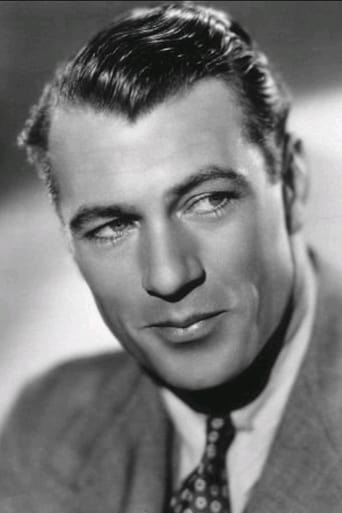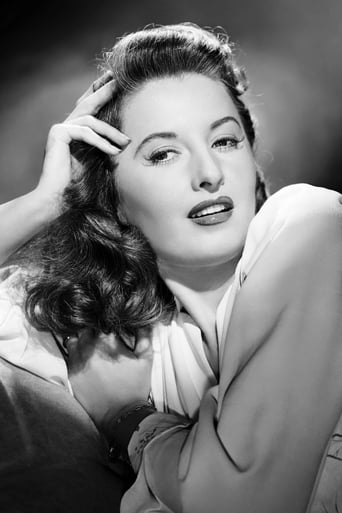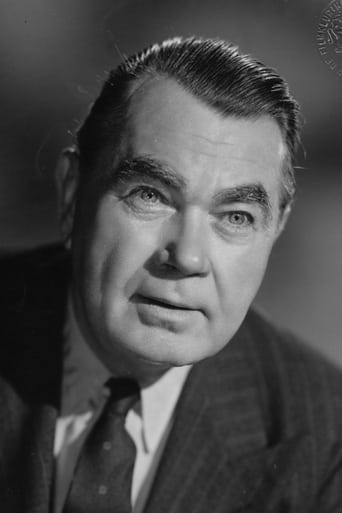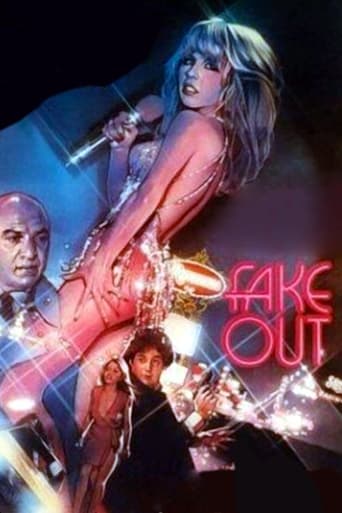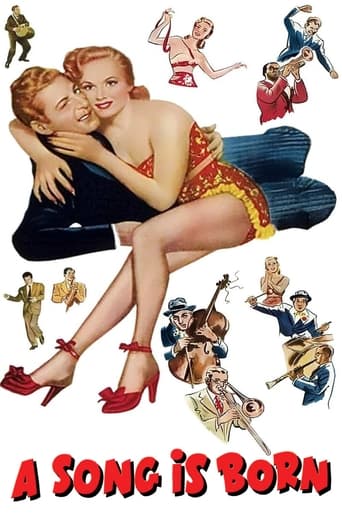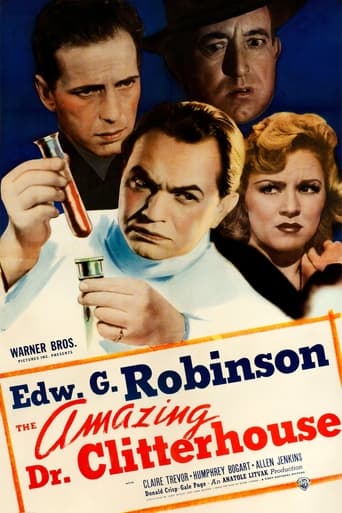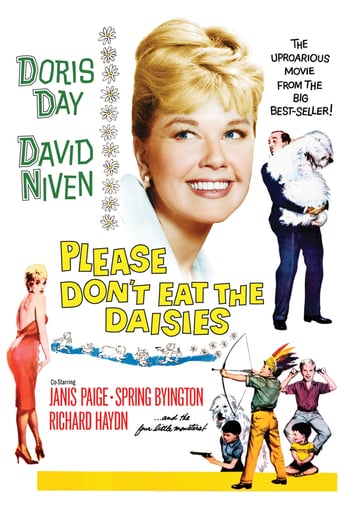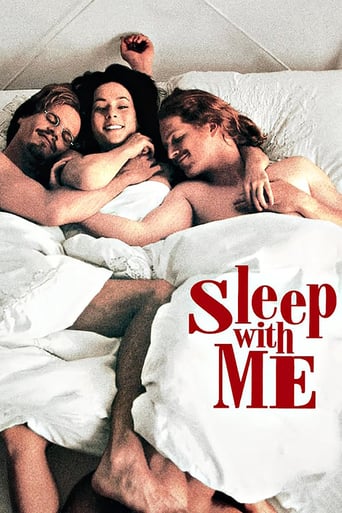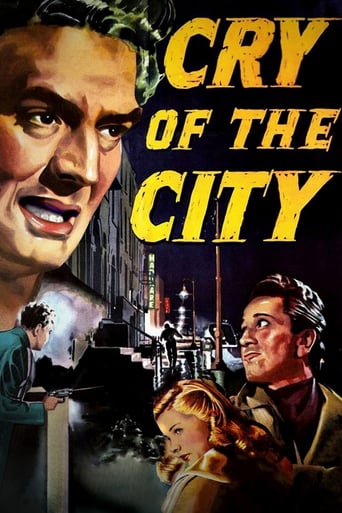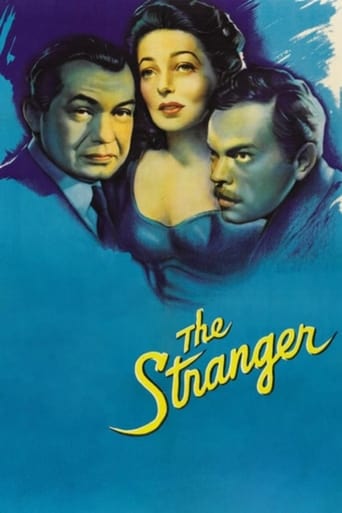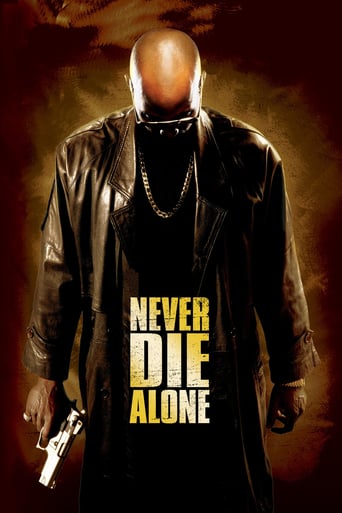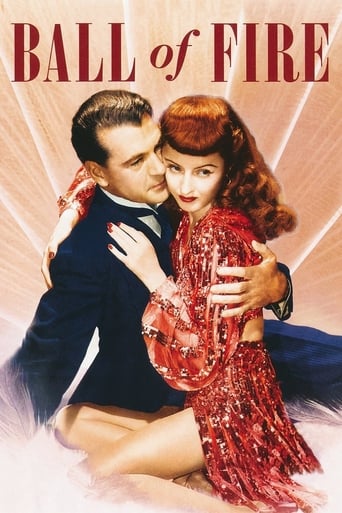
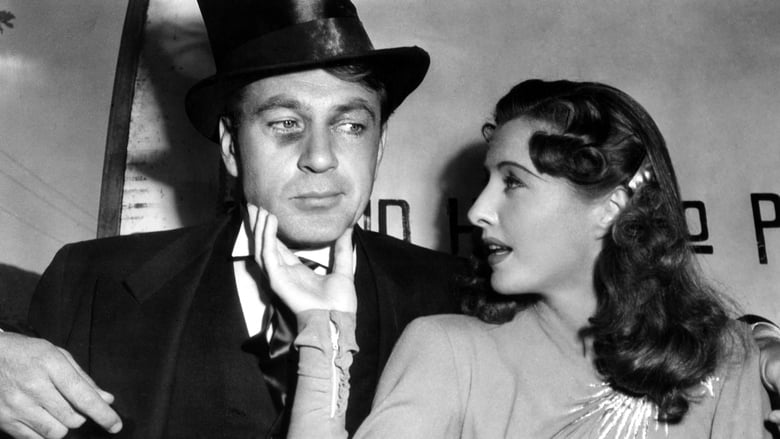
Ball of Fire (1941)
A group of academics have spent years shut up in a house working on the definitive encyclopedia. When one of them discovers that his entry on slang is hopelessly outdated, he ventures into the wide world to learn about the evolving language. Here he meets Sugarpuss O’Shea, a nightclub singer, who’s on top of all the slang—and, it just so happens, needs a place to stay.
Watch Trailer
Cast


Similar titles
Reviews
What a fun movie this is. Gary Cooper and seven other intellectuals are living together in a giant house and are hard at work creating an encyclopedia, a project which has taken them years, when it becomes apparent to Cooper that his knowledge of slang is out of date. He takes to the streets of New York, pen and paper in hand, eventually going to a nightclub. Enter Barbara Stanwyck, all a-glitter and performing "Drum Boogie" with Gene Krupa and his orchestra. Well, Marsha Tilton provided the voice-over, but Stanwyck and the orchestra are captivating, including a reprise using a matchbox and matches for drums, huddled around a table. Unbeknownst to Cooper, Stanwyck needs to hide from the police because of her involvement with a gangster (Dana Andrews), and ends up coming to his house. The casting and acting in this movie is wonderful, from top to bottom. Sparks begin to fly between Cooper and Stanwyck, at first because she's manipulating him into letting her stay, but eventually as his simple considerate nature begins to soften her cynical edges. The seven other professors make a charming group, and include Richard Haydn as Oddley and Henry Travers as Jerome, the latter of whom you'll easily recognize as Clarence from 'It's a Wonderful Life'. Things get complicated with the gangster decides to marry Stanwyck in order to invoke spousal privilege in investigations against him, but I won't spoil it further.There are so many nice little touches in the dialogue of this film: the slang they use (amped up because of Cooper's "research"), the innuendo, and the nerdy references. There is the sweetness of Cooper quoting Richard III when giving Stanwyck a ring: "Look, how this ring encompasseth finger; Even so thy breast encloseth my poor heart. Wear both of them, for both of them are thine." There are fantastic moments, such as when as when the professors sing a couple of rounds of "Sweet Genevieve" while sitting around a table, as well as the look on Stanwyck's face in the scene where Cooper's realized he's being used and walks out in a dignified way, and she finishes his sentence, that she's a tramp. Then of course there's the chemistry between Stanwyck and Cooper. As Cooper tries to send her away he says "Make no mistake, I shall regret the absence of your keen mind. Unfortunately it is inseparable from an extremely disturbing body." Stanwyck replies by saying "I'm going to show you what yum-yum is. Here's yum. (big kiss) Here's the other yum. (big kiss) " Both play their parts perfectly, and while the whole thing is improbable and predictable, the story-telling from Howard Hawks is taut, and it's a lovely romantic comedy. What a year 1941 was for Stanwyck, between this Oscar-nominated performance and 'The Lady Eve'. Great stuff!
Producer Sam Goldwyn has really opened up the purse strings on this all-star musical comedy in which every move both in front of and behind the camera adds up to a glorious feast. Both Gary Cooper and Barbara Stanwyck are in fine fettle, and they're supported by a wonderful array of our favorite character players. Even Elisha Cook, Jr. is on hand. And in addition to the character players like Oscar Homolka, Henry Travers and S.Z. Sakall, we find a number of rising stars in support spots including Dana Andrews as the chief villain and Dan Duryea as another mobster. As usual from Sam Goldwyn, production values are superb. Ball of Fire has a place in history as the last of Hollywood's famous pre-war screwball comedies. World War 2 put paid to this genre. Goldwyn's later attempt to remake the film as a musical for Danny Kaye, A Song Is Born (1948), was not successful. Incidentally, as some viewers have noted, the sound is low on the DVD in some of the earlier scenes, but it improves vastly once Gene Krupa makes his appearance.
"Ball of Fire" opened in the U.S. on Dec. 2, 1941. Europe had been at war for more than a year, and in just five more days Japan would bomb Pearl Harbor, bringing the U.S. into the war. Hollywood made many comedies during the depression to help lift spirits; and now it was doing the same thing to help ease tensions and lift the spirits on the home front. This wonderful comedy has several big name stars, some music and rhythm by Gene Krupa and his band, and a great supporting cast. That includes some of the best supporting actors of the time. Several were foreign- born, all from nations at war. One can imagine the emotion they must have felt. And, how they may have viewed their profession as important for lifting the spirits of the Allies and the hopes of their people back home. The names of many characters are hilarious.Seven of the support cast are professors working with Gary Cooper who plays Prof. Potts. They include Oskar Homolka, born in Vienna, Austria, as Prof. Gurkakoff; S.Z. "Cuddles" Sakall from Budapest, Hungary, as Prof. Magenbruch; Leonid Kinskey from St. Petersburg, Russia, as Prof. Quintana; and three from England, including Richard Hadyn as Prof. Oddly, Henry Travers as Prof. Jerome and Aubrey Mather as Prof. Peagram. One was U.S.-born – Tully Marshall as Prof. Robinson.The film has several other big name actors. Frequent leading man Dana Andrews plays the boss of the bad guys, Joe Lilac. His gang includes Dan Duryea as Duke Pastrami and Ralph Peters as Asthma Anderson. Allen Jenkins is the garbage man. "Ball of Fire" received four Oscar nominations, including best actress for Barbara Stanwyck as Sugarpuss O'Shea. It is a very funny film, with much witty, clever dialog. But, this type of comedy may not be for everyone. Much of the humor develops around language and words. So, those who don't like language and fun with words aren't likely to get much out of this film. But all others should enjoy it immensely. Some of the slang words in the script were a far stretch even for the time of the movie. In a late scene, Duke Pastrami is talking to Sugarpuss: "Now meantime, lay low and stay close to the Ameche." Sugarpuss: "Okay! The what?" Pastrami: "The telephone." Later, she uses it as a slang question to Prof. Potts, whom she calls "Pottsy." When he asks what that is, she explains that it's the name of the inventor of the telephone. He interrupts to say that the inventor of the phone was Alexander , but she interrupts to explain that Ameche played the inventor in the movie. That was a 1939 biopic with Don Ameche, Henry Fonda and Loretta Young. A nice little jab here at the intelligence of those Americans who "learn" their history from the movies. Here are some more funny lines and exchanges from the film. Sugarpuss picks up a book and says, "Oh, Greek philosophy. I've got a set like this with a radio inside." She turns to Potts and says, "Well, how do we start professor? You see, this is the first time anybody moved in on my brain."Potts: "Living in this house, cut off from the world, I've lost touch. And it's inexcusable. That man talked a living language (slang). I embalmed some dead phrases. 'Slang,' as the poet Carl Sandberg has said, 'is language which takes off its coat, spits on its hands and goes to work.'"Sugarpuss: "Who was that guy learned so much from watching an apple drop?" Prof. Gurkakoff: "Isaac Newton, 1642 to 1727, the law of gravity." Sugarpuss: "Yeah, that's him. And I want you to look at me as another apple, Professor Potts. Just another apple."Potts: "For four days we have been drifting, Miss O'Shea. The needle of the compass no longer points to the magnetic pole. It points, if I may say so, to your ankle. I shall regret the absence of your keen mind. Unfortunately, it is inseparable from an extremely distracting body."Sugarpuss: "Don't tell me the jive session has beat off without baby."Potts: "Miss O'Shea, the construction 'on account of because' outrages every grammatical law." Sugarpuss: "So what? I came on account of because I couldn't stop thinking about you after you left my dressing room. On account of because I thought you were big and cute and pretty."Prof. Magenbruch: "I thought you meant to leave us in protest, Miss Bragg." Miss Bragg: "A nurse does not quit her post when an epidemic reaches a crisis."Sugarpuss reads the inscription inside a ring: "Richard ill. Who's Richard ill?" Potts: "Richard the Third."Joe Lilac on the phone: "Where are you? We're not down here to enjoy ourselves. This is a wedding."Sugarpuss: "Eight squirrelly cherubs, right out of this world." Prof. Magenbruch: "Did you hear, Potts? I'm a squirrelly cherub?"Potts: "Now let's have it out. I made an ass of myself and I know it." Prof. Jerome: "Oh well, we all have." Potts: "Yes, but I was the lead donkey."Prof. Oddly, a widower the past 20 years, offers some courtship advice to Potts: "Being a botanist, I find an astonishing parallel between a woman's heart and the wind flower, or anemone nemorosa. Perhaps you know the plant, how it waits for the warm sunshine and soft winds before it unfolds its petals. Sensitive and delicate. One rough, impetuous bee can completely destroy the blooms."Prof. Magenbruch: "Did you did you get the records?" Prof. Peagram: "Well, they were all out of 'Beat Me Daddy, Eight to the Bar.' But I got 'Chicka Chicka Boom Boom' and 'Shoot the Sherbet to Me Herbert.'"
Howard Hawks' "Ball of Fire" is a a sly urban updating of the Snow-White fairy tale, as well as an effervescent look at the fertile potential of clashing cultures. Stanwyck's "Sugarpuss" O'Shea is fast-talking and sexy, a showgirl who bewitches Gary Cooper's English professor with her invigorating vocabulary, as well as her dishy ankles. Cooper's Professor Bertram Potts is a young stuffed shirt, self-entombed in a fusty, academic cloister where he and 7 other reclusive intellectuals hammer away at writing an encyclopedia. Sugarpuss invades the hermitage with a bright, modern femininity; she is bold, playful, and self-possessed, reviving the inert libidos and general joie de vivre of the whole bashful fraternity. In one delightful scene, she instructs the clumsy, inexperienced older men in a bracing conga line. Foxy Stanwyck and an impressive crew of consummate character actors bring great humor and sweetness to the kind of scene that in other hands might become merely corny. Though Sugarpuss rejuvenates the men with the energy of youth, she requires a different kind of rejuvenation. As the film reminds us, detached vitality is what make a shark a shark. The academic brotherhood may be stale and lonely, but they are open-hearted and loyal. Unlike Sugarpuss' calculating gangster boyfriend, played slickly by Dana Andrews, Professor Potts is tender and thoughtful. Most importantly, the young "Pottsy", as Sugarpuss calls him, is also trusting enough to look foolish. In Howard Hawks' films, making a fool of oneself is often linked to the experience of real love. Being guileless enough to be undone by genuine emotion is proof of valor. Both boyish and stiff, Cooper is pitch perfect here. As he falls for Sugarpuss, his face reveals all-- staid shyness competes with impassioned delight. We root for him.But being sweet and genuine aren't enough. This is a film about essential combinations: passion and intellect, sweetness and vigor.It's not until Potts avers his PHYSICAL passion for Sugarpuss that her heart really gives over. Later he must engage in fisticuffs, surely the first of his life, with the smug gangster. Despite amusingly nerdy preparation(he studies a hardbound guide to pugilism), the actual battle awakens his animal instincts. His earlier effete intellectualism is now fully redeemed.Hawks' film is unequivocal: Without lusty physical vigor, we're entombed. Without tender, intimate relationships, we may as well jump in the ocean and swim the clock round.Two Notes:1. This film is neither anti-intellectual NOR anti-working class. It fully admires street-smart vigor and creativity while also embracing the love of more formal learning. In our era, a film like this is a bracing reminder that a fertile exchange is possible (and improving for all involved.)2. This is the kind of role that MAINSTREAM cinema used to provide actresses: smart, tough, edgy, sexy and eloquent.


